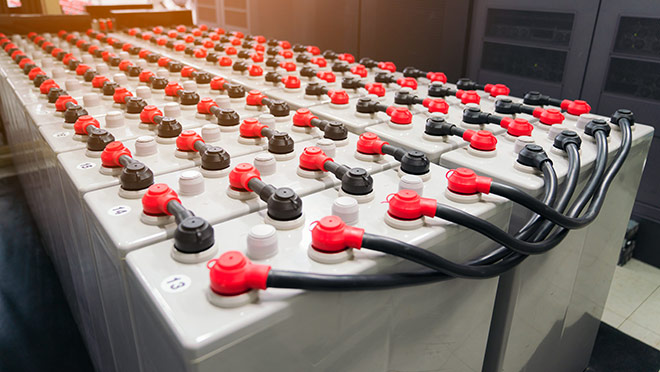The benefits of battery storage

Get ready for industrial battery storage
Not too long ago, it was almost inconceivable that an industrial facility could be powered by a battery – even for just a short time. But battery technology is evolving so fast that it's now becoming a reality. Remember 10 years ago when a world full of electric vehicles seemed like a distant part of the future? That's exactly the stage industrial battery storage is at right now. And just like electric vehicles, you're going to be hearing a lot more about battery storage over the next five to 10 years.
There's plenty of federal interest in energy storage as a whole, and with good reason. "Few areas offer greater potential for building that's safer, greener, or more competitive than energy storage," the former Canadian Minister of Natural Resources, Seamus O'Regan told an energy conference in late 2020.
Emergency back-up power during an outage, and other benefits
Battery storage is good for both productivity and the environment, offering significant benefits, including:
- An emergency back-up energy supply. With extreme weather incidents becoming more and more frequent, battery storage provides instant access to emergency power without the noise and environmental impacts of generators.
- Reducing strain on the grid. As battery storage increases, the amount of power needed in periods of peak demand should decrease, which could reduce the need for additional electrical infrastructure or costly upgrades.
- Wind and solar power storage. Wind and solar energy production is often unpredictable and intermittent. Being able to capture and store it for future usage could make these energy sources a more viable solution.
Battery storage can help lower your bill
Along with the benefits listed above, battery storage can also help you to reduce your peak demand charges, depending on your electricity usage.
Demand is the rate that you use electricity, measured in kilowatts (kW). Peak demand is the highest rate of electricity use during a period of time. The highest 15-minute demand average recorded in each billing period is used to calculate the demand charge on your bill.
"We need to reserve that amount for you just in case you need it again," explains Steve Cao, Senior Industrial Program Manager at BC Hydro. "And if we reserve that amount for you, we can't use it somewhere else. So, if you're only using that much electricity once or twice a year, it's clearly not an efficient use of your demand."
If you're seeing big peak demand charges on your bill, the first thing to do is think about planning your usage.
"Peak demand generally applies to our medium and large customers," says Steve. "By factoring energy costs in your production schedule, you can explore whether there's a way to maintain productivity with a smaller peak – or maybe even no peak."
"If your machinery is running at the same intensity all day long, a battery isn't going to have any impact. But if you have variations during the day with spikes in intensity, then a battery can kick in during those spikes to reduce or eliminate your peak demand."
The types of businesses that could benefit from battery storage
So far, it seems that two specific types of battery storage scenarios are emerging – short and long duration:
| Battery type | Short duration | Long duration |
| Operation time | ~4 hours | ~6-10 hours |
| Suitable for |
|
|
| Potential use |
|
|
Technological advancement and higher capacity batteries on the horizon
A study earlier this year from National Research Council Canada (NRC) noted that battery storage is the most common large-scale option today, mostly due to the ubiquity of lithium-ion (Li-ion) batteries and their increasing energy density (i.e., the amount of energy that can be stored per unit of weight). Over the past 10 years, Li-ion energy densities have almost tripled.
These advances in battery technology mean we'll see higher capacity batteries become available over the next few years. And in Canada, we're lucky to not only be right at the forefront of this technology, but also rich in the necessary natural resources, meaning that battery storage may not suffer some of the supply chain issues we're all increasingly experiencing for other technologies.
Is your business already using battery storage?
If your business is already using battery storage, we'd like to hear about your experience. Tell us about your battery storage set-up and you could be eligible for BC Hydro pilot programs and studies.
To learn more, contact your Key Account Manager or Regional Energy Manager, or call us at 604 522 4713 in the Lower Mainland or 1 866 522 4713 elsewhere in B.C.